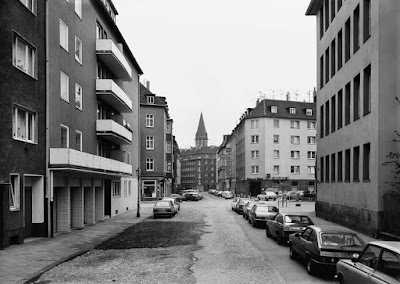 |
 |
 |
 |
 |
 |
 |
 |
Press Release
The Düsseldorf-based artist Thomas Struth is among the most important contemporary German photography. Numerous exhibitions over the past 15 years in Europe, the USA, and a number of Asian countries have made Struth – who was born in the Lower Rhine region in 1954 – internationally famous. To date, only individual work series have been presented publicly. Now, the Kunstsammlung Nordrhein-Westfalen presents a representative overview of Struth’s entire oeuvre in Europe for the first time. Organized in cooperation with the Kunsthaus Zürich, this exhibition was supplemented by more than 100 additional works following its initial showing in Switzerland. The emphasis now lies clearly on the creative production of the past decade. The most recent works are being shown in Düsseldorf only.
Special attention is also being devoted to a number of photographs from the series entitled “Streets ,” none of them previously shown publicly. Together with the jungle pictures of the “Paradise” series, a selection of black-and-white photographs featuring Düsseldorf's streetscapes form an independent presentation in the Grabbehalle of the K20. This expansive image installation – assembled especially by the artist himself – is being shown in Düsseldorf exclusively.
At a time when we are subjected daily to a flood of imagery, Thomas Struth is one of the outstanding artists who have succeeded in endowing the photographic medium with a new intensity and effectiveness. Struth attended the Düsseldorf Art Academy, initially studying painting with Gerhard Richter, and beginning in 1976, photography with Bernd Becher. As early as 1992, Struth’s work was seen at the documenta IX in Kassel. At the center of his artistic endeavor is precision of vision. Whether the impenetrable undergrowth of the Asian jungle, large-format museum scenes (“Audiences” ), or the recent large-scale images of technical facilities: his image sequences consistently thematize the relationship between beholder and beheld, at the same time posing questions about the individual in society. Struth avoids any overt dramatization of his motifs, concentrating instead entirely on the analysis of perceptual data. The fact that he discovers his motifs on trips through Europe, the Americas, East Asia, and Australia underscores the significance of his creative production in a world that has been shaped so profoundly by globalization.
In conjunction with this exhibition, and in collaboration with guitarist Frank Bungarten, Struth presents “Music” in the “Laboratory,” the exhibition space of the Education Department. This project offers a provocative acoustic contrast to the spectrum of visual impressions confronting visitors throughout the exhibition. Musik allows the works of art in the permanent collection to be experienced in an extended sensory context. Audible is a range of music selected by Struth and Bungarten and drawn from a variety of cultures and genres. A special highlight of this project takes place in May, when a master course is scheduled for the Laboratory, during which high-ranking musicians will give music instruction before the public.
Kunstsammlung Nordrhein-Westfalen,
Grabbeplatz 5 40213 Düsseldorf, Germany,
29 May 2011
Press Release
The Düsseldorf-based artist Thomas Struth is among the most important contemporary German photography. Numerous exhibitions over the past 15 years in Europe, the USA, and a number of Asian countries have made Struth – who was born in the Lower Rhine region in 1954 – internationally famous. To date, only individual work series have been presented publicly. Now, the Kunstsammlung Nordrhein-Westfalen presents a representative overview of Struth’s entire oeuvre in Europe for the first time. Organized in cooperation with the Kunsthaus Zürich, this exhibition was supplemented by more than 100 additional works following its initial showing in Switzerland. The emphasis now lies clearly on the creative production of the past decade. The most recent works are being shown in Düsseldorf only.
Special attention is also being devoted to a number of photographs from the series entitled “Streets ,” none of them previously shown publicly. Together with the jungle pictures of the “Paradise” series, a selection of black-and-white photographs featuring Düsseldorf's streetscapes form an independent presentation in the Grabbehalle of the K20. This expansive image installation – assembled especially by the artist himself – is being shown in Düsseldorf exclusively.
At a time when we are subjected daily to a flood of imagery, Thomas Struth is one of the outstanding artists who have succeeded in endowing the photographic medium with a new intensity and effectiveness. Struth attended the Düsseldorf Art Academy, initially studying painting with Gerhard Richter, and beginning in 1976, photography with Bernd Becher. As early as 1992, Struth’s work was seen at the documenta IX in Kassel. At the center of his artistic endeavor is precision of vision. Whether the impenetrable undergrowth of the Asian jungle, large-format museum scenes (“Audiences” ), or the recent large-scale images of technical facilities: his image sequences consistently thematize the relationship between beholder and beheld, at the same time posing questions about the individual in society. Struth avoids any overt dramatization of his motifs, concentrating instead entirely on the analysis of perceptual data. The fact that he discovers his motifs on trips through Europe, the Americas, East Asia, and Australia underscores the significance of his creative production in a world that has been shaped so profoundly by globalization.
In conjunction with this exhibition, and in collaboration with guitarist Frank Bungarten, Struth presents “Music” in the “Laboratory,” the exhibition space of the Education Department. This project offers a provocative acoustic contrast to the spectrum of visual impressions confronting visitors throughout the exhibition. Musik allows the works of art in the permanent collection to be experienced in an extended sensory context. Audible is a range of music selected by Struth and Bungarten and drawn from a variety of cultures and genres. A special highlight of this project takes place in May, when a master course is scheduled for the Laboratory, during which high-ranking musicians will give music instruction before the public.
